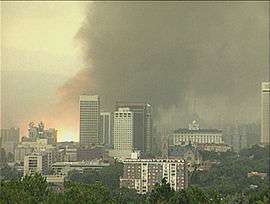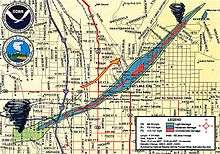1999 Salt Lake City tornado
 The Salt Lake City Tornado of 1999 as it rips through downtown; the orange fireball is a power substation exploding upon contact with the tornado. | |
| Formed | August 11, 1999 12:41–12:55 p.m. MDT (18:45–18:55 UTC) |
|---|---|
| Max rating1 | F2 tornado |
| Damage | $170 million USD |
| Casualties | 1 fatality, 100+ injuries |
| Areas affected | Downtown Salt Lake City |
| 1Most severe tornado damage; see Fujita scale | |
The 1999 Salt Lake City tornado was a very rare tornado that occurred in Salt Lake City, Utah on August 11, 1999, during an unusually strong summer monsoon season. It was among the most notable tornadoes to hit west of the Great Plains in the 20th century and the second tornado to hit in Utah that resulted in a fatality (the other occurring in 1884). This was the sixth significant tornado in Utah since June 1963.[1]
Meteorological synopsis
In Salt Lake Valley, the day began with calm but cloudy weather. As the day progressed, the clouds became steadily darker until nearly all light was obscured. Winds were still nearly calm, with the exception of a few microbursts. Hail preceded and followed this tornado, which was rated a strong F2 on the Fujita scale. At 12:41 p.m., 1 1⁄2 inches (3.8 cm) diameter hail was reported near the town of Herriman. Afterwards, the storm started rotating, and at around 1:00 pm, many people reported seeing the storm rotate (forming a mesocyclone) as it moved into downtown Salt Lake City. A non-descending funnel cloud developed and traveled from western downtown toward the northeast before terminating near Memory Grove Park upon reaching the base of the Wasatch Mountains.[1]
Damage


The tornado uprooted trees and destroyed temporary tents set up for the National Outdoor Retailers Association convention, claiming the life of one booth set-up supervisor, Allen Crandy, 38, of Las Vegas. In The Avenues, over 120 homes were severely damaged and had roofs blown off and 34 homes were severely damaged. Over 100 people were reported injured and a dozen critically.
The Delta Center (now the Vivint Smart Home Arena), home of the Utah Jazz of the National Basketball Association, suffered minor damage. All of the windows from the nearby Wyndham Hotel (now the Radisson Hotel), across the street from the temporary tents, were broken out, raining down shards of glass on people attempting to escape from the collapsed tents. Construction cranes for the LDS Conference Center were toppled by the storm, which nearly struck the city's landmark Salt Lake Temple. The temple was one of the buildings to make it through the tornado. Damage to historic buildings in the lower Capitol Hill area of Salt Lake was reported. Nearly all of the trees in Memory Grove, a World War I memorial park at the mouth of City Creek Canyon near downtown, were reportedly torn out, as well as hundreds of old trees on the Capitol grounds. A tree used as a popular photo spot at the Salt Lake Temple, commonly after marriages, was also destroyed.
This was the first major tornado to occur in a major urban area's downtown district and strike buildings of nearly 500 ft (150 m) tall according to Bill Alder of the National Weather Service. Ironically, it happened in an area of the U.S. where tornadoes are quite rare. The governor of Utah in 1999, Michael O. Leavitt, heard the sound of the tornado moving between the tall high-rise buildings just before the windows blew out. The tornado caused approximately $170 million in damage.[2]
See also
References
- 1 2 Clayton Brough; Dan Brown; David James; Dan Pope; Steve Summy (2007-06-26). "Utah's Tornadoes & Waterspouts - 1847 to the present". National Weather Service. Retrieved 2007-08-04.
- ↑ "National Weather Service - NWS Salt Lake City". Wrh.noaa.gov. Retrieved 2013-12-23.
| Wikimedia Commons has media related to Salt Lake City Tornado. |